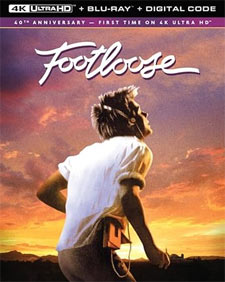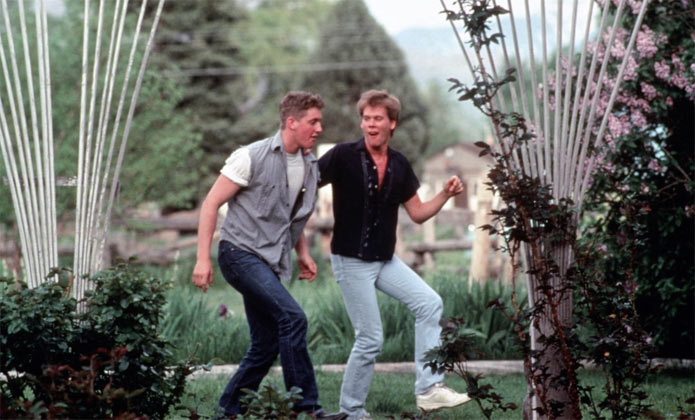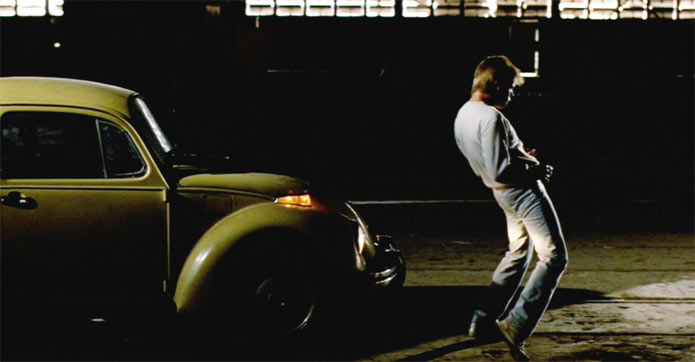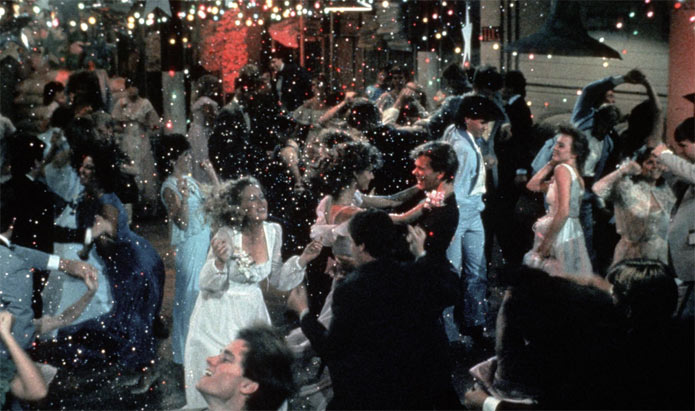
Footloose

 (for violence, language and sexuality)
(for violence, language and sexuality)
Director: Herbert Ross
Starring: Kevin Bacon, Lori Singer, John Lithgow, Chris Penn, Sarah Jessica Parker, Dianne West
Running Time: 1 hour, 47 minutes
Theatrical Release Date: February 17, 1984
4K UHD Release Date: February 13, 2024 (Amazon.com)
Plot Summary
A city teenager moves to a small town where rock music and dancing have been banned, and his rebellious spirit shakes up the populace. (from IMDb)
Film Review
It’s kind of wild when you take the time to revisit a movie from your childhood to watch it with fresh eyes at a completely different point in your life. As an adult, a movie like Footloose lands completely different than when seeing it as a young kid. With its 40th anniversary this year, Footloose gets its 4K UHD debut, revitalizing the movie for a new generation. In 1984’s Footloose, Kevin Bacon stars as teenager Ren McCormack, who moves from a big city to the small town of Bomont. The town is so small in fact, that everyone knows each other and their personal lives, with Rev. Shaw Moore serving as the town’s morality guide. A tragedy in the town years earlier led to the outlawing of all rock music and dancing, with Rev. Moore preaching these to be catalysts for sinful acts. Meanwhile, his teenage daughter Ariel rails against the town’s – and her father’s – authority, living wild and recklessly. There ends up being quite a bit to unpack in this movie, thematically, and seeing this movie again now, as a Christian adult – and parent of a young teen, I came away from my viewing with a lot of thoughts and feelings about what Footloose had to say.

First of all, I was surprised to learn that the story of Footloose was actually loosely based on real events in a small town in 1978, where dancing had also been outlawed. Seeing the movie as a little kid, much of the plot went over my head. I always thought the movie had painted Rev. Moore as a completely misguided villain, so I was surprised to find that to not be the case during my rewatch. Ren’s presence in Bomont does shake things up considerably, but he’s less the troublemaker the town thinks he is and more the victim of just being an outsider and fish out of water. Then you have Ariel who nearly kills herself more than once doing reckless attention-getting stunts, like standing in front of an oncoming train and screaming until Ren tackles her to safety. She also clearly has a boyfriend – with whom she even sleeps with – but is so intrigued by Ren that she pretty much chases him for much of the movie. The only way the story can tilt the viewers in her favor in the midst of her disloyalty to Chuck, is when he gets physically abusive in response to her unfaithfulness to him. She’s a strangely inconsistent character, too, because following a rebellious move to play rock music at a hot teenage hangout spot, she seems to genuinely apologize to her pastor father for her mistake, but then seems to go out of her way to defy him in everything else she does. If director Herbert Ross was hoping Ariel would be an infectiously likeable character, he failed miserably.

It’s interesting to look at the story and see both Ren’s viewpoint and Rev. Moore’s and understand both. And while it’s understandable that a small town could be affected strongly enough by loss to want to over protect its inhabitants – especially the youth, the over-sheltering only pushes the kids to rebel. As Moore’s wife tells Shaw later in the movie, it doesn’t take dancing to get teenagers riled up sexually. She mentions that even just looking into each other’s eyes was once enough for them. Ren is also never shown to be using dance as anything other than a means of expression or release of frustration. Ariel also eventually leads Ren to passages in the Bible where David expressed his praise through dance and how the scriptures often encouraged dancing (Although one could argue the dancing was intended to glorify God, which was never any of the teens’ intent in the film, but I digress). And while the movie opens with Rev. Moore delivering a fire-and-brimstone message to the people of Bomont, the story progresses in a way to show that Moore just really cares for the townspeople and wants the best for them. All the while, Ariel seems determined to run the opposite way from her father’s guidance and teachings.
As a movie, Footloose feels exceptionally dated. And since it’s a movie about extreme circumstances in a small town, there isn’t a lot about it that’s specifically relatable — other than what it’s like to be a new kid in a new school, or any kind of romantic drama during our teen years. One could even make the argument that much of the plot of Footloose is corny or downright silly, but the earnest performances from the central cast do well to sell all of it.
Although Star-Lord would vehemently disagree with this opinion, I don’t think Footloose holds up as the timeless 80’s classic that many consider it to be. Sure, Bacon turns in a memorable performance, and the warehouse dance sequence and prom finale are surely ones to stick with you, but the bulk of the movie is kind of typical fare from the decade. The movie feels a bit like a musical, but it’s mostly driven by 80’s pop hits, which makes the movie more appealing to those who wouldn’t normally sit down to watch an actual musical. I also think one of the biggest drawbacks to the film is how unlikeable Ariel is as a character. If she’s so fickle towards those she seems to care about most, what’s supposed to make us think she’ll stick with Ren for the long haul?

Footloose is rated PG, but it’s at the very least a PG-13 grade film content-wise. In fact, I read that they cut out some random male nudity and an “F” word to get a re-rating from its original R rating. The aforementioned male nudity is still present in some form during a conversation between Ren, Willard and the other guys while in the boys shower and locker room. As the guys chat in the foreground, we clearly see the bare butt of another student showering in the background. We then see a naked guy walk by with his genitals just barely covered by a wall in the foreground. It’s fiercely unnecessary nudity that is jarring and comes out of nowhere. There’s also a sequence where we see Ariel with her boyfriend Chuck in the woods on a blanket. She’s buttoning up her pants and putting her boots on, while he lays there without a shirt. It’s obvious what they just finished doing, and she even straddles him (while clothed) at one point while they talk. Other characters make remarks about her having been “kissed a lot,” to imply she gets around, and there’s a scene where she’s arguing with her father and she exclaims to him that she isn’t a virgin. One conversation Ren has with Willard early in their friendship has him telling him a story about meeting a girl while dancing, then basically having sex with her in the car afterwards. As Willard listens with eagerness, he asks “Really??” to which Ren admits “No.” and reveals that the real story ended on the dance floor. In addition to sexual content, there’s a surprising amount of profanity that runs through the course of the movie, with quite a few uses of the “S” word, “S.O.B.” and an assortment of blasphemous phrases. Finally, there’s quite a bit of teen violence where some of the guys bully each other and get into fights, but the worst is when Ariel’s boyfriend Chuck punches and slaps her in a disturbing scene of domestic violence. Surprisingly enough, too, there aren’t any immediate consequences for Chuck… until his eventual comeuppance at the end of the movie. And, as touched on earlier, Ariel risks her life in two insanely dangerous stunts, one being the aforementioned train stunt, and another where she climbs out of one car into Chuck’s pickup truck while the cars are driving alongside each other, and then stands on the doors of both cars while a tractor trailer bears down on them. It’s bonkers.
Again, there’s quite a bit to unpack when processing 1984’s Footloose. If you’re already a fan of the movie, there isn’t much to say, but if you’ve never seen it, there’s a good chance what you find here will surprise you. As far as the 4K release goes, it’s “good,” but the grainy source footage can only get so clear, and the color may not be quite as vibrant as you might expect for the format. It’s probably still the best picture quality the movie has ever had, but the question remains: is it better than the HD Blu-Ray transfer? Probably not by much. The 4K disc doesn’t have any special features at all, but the set includes a digital copy and a Blu-Ray disc which includes previously-released extras.
– John DiBiase (reviewed: 2/11/24)
4K UHD Special Features
Newly remastered, FOOTLOOSE will be available in a two-disc 4K Ultra HD/Blu-ray™ set or a collectible SteelBook™ with artwork designed to look like an 80s Walkman. Both sets include access to a digital copy of the film and the Blu-ray includes the legacy bonus content detailed below:
- Commentary by Craig Zadan and Dean Pitchford
- Commentary by Kevin Bacon
- Let’s Dance! Kevin Bacon on Footloose
- From Bomont to the Big Apple: An Interview with Sarah Jessica Parker
- Remembering Willard
- Kevin Bacon’s Screen Test
- Kevin Bacon Costume Montage
- Footloose: A Modern Musical – Part 1
- Footloose: A Modern Musical – Part 2
- Footloose: Songs That Tell A Story
- Theatrical Trailer
Parental Guide: Content Summary
![]() Sex/Nudity: In the opening scene, Rev. Moore talks about the sexuality of rock music and people reading pornographic books; Teen girls talk about a girl having her baby and one makes a comment “you can’t buy a diaphragm thru the mail”; Ariel presses play on a boombox playing a song with a chorus about “dancing in the sheets”; We briefly hear a couple girls talking in a background and one remarks about a guy who “had his hands all over…” but we don’t hear the rest of what she says; Ren tells Willard a story about dancing close to a girl and that “she wanted to do more than dance.” He then says, by the time they got to the car, her tongue was in his ear. He then talks about going to the car and the seats recline “all the way back.” He says she ripped his shirt off, and he talks about them going at it and her calling out loudly. (He describes it as “make ginger pop”). In amazement, Willard asks if it really happened and he says “No.” But they “did dance a lot”; After Willard tells Ren that he thinks Ariel has kissed a lot of guys, we see Ariel and Chuck in the woods on a blanket. He’s shirtless and she’s buttoning up her pants and putting her boots on. While they talk, she briefly straddles him, but nothing else happens; Ren makes a comment that he would like to “paste a Playboy centerfold into every church hymnal” to get back at Rev. Moore; We see Ren and his friends talking in the high school shower. We see a random guy’s bare butt in the background. Another guy walks by and we see some pubic hair but everything below it is blocked; Chuck says to Ariel, “You’re just dying to screw him” about Ren; Chuck calls Ariel a “b*tch in heat”; Ren and Ariel kiss very passionately; Rev. Moore says that when kids dance together, they get sexually irresponsible. His wife says kids don’t need dancing to get excited and then asks, “don’t you remember when we just looked at each other, we got excited?”; While arguing with her reverend father, Ariel comments how he believes dancing leads to “fornicating.” She then tells him she’s not even a virgin.
Sex/Nudity: In the opening scene, Rev. Moore talks about the sexuality of rock music and people reading pornographic books; Teen girls talk about a girl having her baby and one makes a comment “you can’t buy a diaphragm thru the mail”; Ariel presses play on a boombox playing a song with a chorus about “dancing in the sheets”; We briefly hear a couple girls talking in a background and one remarks about a guy who “had his hands all over…” but we don’t hear the rest of what she says; Ren tells Willard a story about dancing close to a girl and that “she wanted to do more than dance.” He then says, by the time they got to the car, her tongue was in his ear. He then talks about going to the car and the seats recline “all the way back.” He says she ripped his shirt off, and he talks about them going at it and her calling out loudly. (He describes it as “make ginger pop”). In amazement, Willard asks if it really happened and he says “No.” But they “did dance a lot”; After Willard tells Ren that he thinks Ariel has kissed a lot of guys, we see Ariel and Chuck in the woods on a blanket. He’s shirtless and she’s buttoning up her pants and putting her boots on. While they talk, she briefly straddles him, but nothing else happens; Ren makes a comment that he would like to “paste a Playboy centerfold into every church hymnal” to get back at Rev. Moore; We see Ren and his friends talking in the high school shower. We see a random guy’s bare butt in the background. Another guy walks by and we see some pubic hair but everything below it is blocked; Chuck says to Ariel, “You’re just dying to screw him” about Ren; Chuck calls Ariel a “b*tch in heat”; Ren and Ariel kiss very passionately; Rev. Moore says that when kids dance together, they get sexually irresponsible. His wife says kids don’t need dancing to get excited and then asks, “don’t you remember when we just looked at each other, we got excited?”; While arguing with her reverend father, Ariel comments how he believes dancing leads to “fornicating.” She then tells him she’s not even a virgin.
![]() Vulgarity/Language: 16 “S” words, 1 “Oh J-sus,” 1 “J-sus,” 4 “g*dd*mn,” 5 “S.O.B,” 12 “h*ll,” 2 “a” words, 3 “*ssh*le,” 2 “d*mn,” 3 “p*ss,” 1 “d*ck,” 2 “G-d,” 2 “Oh G-d,” 1 “Oh my G-d,” 1 “b*tch,” 1 “scr*w,” 1 “b*lls,” 1 “f*g,” 1 “d*uchebag”
Vulgarity/Language: 16 “S” words, 1 “Oh J-sus,” 1 “J-sus,” 4 “g*dd*mn,” 5 “S.O.B,” 12 “h*ll,” 2 “a” words, 3 “*ssh*le,” 2 “d*mn,” 3 “p*ss,” 1 “d*ck,” 2 “G-d,” 2 “Oh G-d,” 1 “Oh my G-d,” 1 “b*tch,” 1 “scr*w,” 1 “b*lls,” 1 “f*g,” 1 “d*uchebag”
![]() Alcohol/Drugs: A kid tries to give Ren a joint, but he doesn’t want it and tries to give it back. A teacher then catches Ren with it, and he races to the bathroom and flushes it before the teacher could see it; We see Ren drinking from a bottle; We see underage drinking in a dance club; Willard drinks a lot at the club.
Alcohol/Drugs: A kid tries to give Ren a joint, but he doesn’t want it and tries to give it back. A teacher then catches Ren with it, and he races to the bathroom and flushes it before the teacher could see it; We see Ren drinking from a bottle; We see underage drinking in a dance club; Willard drinks a lot at the club.
![]() Blood/Gore: Willard has lots of blood on his face after being punched. The rag he holds to his nose is also soaked in blood; Ariel has blood on her mouth and on her cheek and nose after Chuck hits her; Ariel later is seen with a black eye.
Blood/Gore: Willard has lots of blood on his face after being punched. The rag he holds to his nose is also soaked in blood; Ariel has blood on her mouth and on her cheek and nose after Chuck hits her; Ariel later is seen with a black eye.
![]() Violence: Ariel climbs out of a car into a truck while they’re driving alongside each other on a long road. A tractor trailer approaches and she stands with one foot on either open car window and throws her hands in the air and screams. Before the truck can hit them, Chuck pulls her inside his vehicle; Chuck and Ren end up playing the game “chicken” with two tractors. They charge their tractors at each other, and before Ren can jump off, his shoelace gets caught on the pedal and he can’t get out. This causes Chuck to panic and swerve out of the way. He jumps over a hill into a stream and his tractor overturns; Ren throws a bottle and it shatters; Ariel stands on train tracks and screams at an oncoming train. Just before she’s actually hit, Ren tackles her to the ground to save her; A man punches Willard in the face; Rev. Moore slaps his daughter Ariel across the face; Some teens jump Ren and put him in a choke hold. A friend of Ren’s comes to his aid and holds one of the other kids in a choke hold against the side of a phone booth and asks him how he likes it; Ariel punches Chuck in the face and he slaps her across the face hard. She then grabs a pipe and smashes his truck’s windshield. He grabs her and punches her a couple more times, even pinning her to the ground; Someone throws a rock through the little kids’ window and the children wake up screaming in terror; We see some of the townspeople burning objectionable books; Chuck tries to get Willard to fight, but Rusty won’t let him. Chuck kicks Willard in the butt and then punches him and beats on him. Willard then fights back. Chuck and his friends get into a fight with Willard and then attack and fight Ren, too, who then gets the upperhand and kicks Chuck in the face. While Chuck is kneeling from the hit, Ren grabs him by the hair and punches him in the face to finish him off.
Violence: Ariel climbs out of a car into a truck while they’re driving alongside each other on a long road. A tractor trailer approaches and she stands with one foot on either open car window and throws her hands in the air and screams. Before the truck can hit them, Chuck pulls her inside his vehicle; Chuck and Ren end up playing the game “chicken” with two tractors. They charge their tractors at each other, and before Ren can jump off, his shoelace gets caught on the pedal and he can’t get out. This causes Chuck to panic and swerve out of the way. He jumps over a hill into a stream and his tractor overturns; Ren throws a bottle and it shatters; Ariel stands on train tracks and screams at an oncoming train. Just before she’s actually hit, Ren tackles her to the ground to save her; A man punches Willard in the face; Rev. Moore slaps his daughter Ariel across the face; Some teens jump Ren and put him in a choke hold. A friend of Ren’s comes to his aid and holds one of the other kids in a choke hold against the side of a phone booth and asks him how he likes it; Ariel punches Chuck in the face and he slaps her across the face hard. She then grabs a pipe and smashes his truck’s windshield. He grabs her and punches her a couple more times, even pinning her to the ground; Someone throws a rock through the little kids’ window and the children wake up screaming in terror; We see some of the townspeople burning objectionable books; Chuck tries to get Willard to fight, but Rusty won’t let him. Chuck kicks Willard in the butt and then punches him and beats on him. Willard then fights back. Chuck and his friends get into a fight with Willard and then attack and fight Ren, too, who then gets the upperhand and kicks Chuck in the face. While Chuck is kneeling from the hit, Ren grabs him by the hair and punches him in the face to finish him off.
